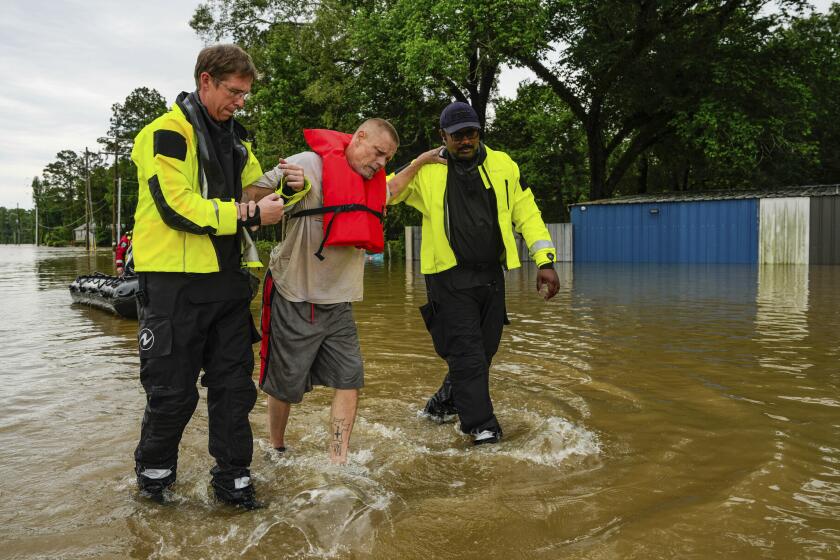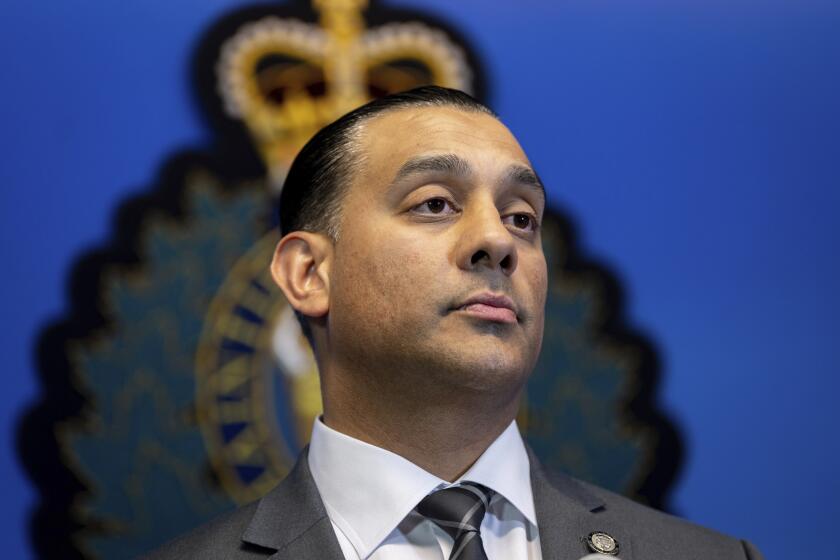Justices Debate Ouster of Gay Boy Scout
The Supreme Court struggled Wednesday over whether the Boy Scouts have a constitutional right to exclude gays, atheists and others who do not fit within their moral code.
That issue arose only because the New Jersey Supreme Court, in a one-of-a-kind decision, ruled that the Scouts are a type of public business and therefore may not, in keeping with state law, discriminate against people based on race, gender, religion or sexual orientation.
For the record:
12:00 a.m. May 3, 2000 For the Record
Los Angeles Times Wednesday May 3, 2000 Home Edition Part A Part A Page 3 Metro Desk 1 inches; 31 words Type of Material: Correction
Scout controversy--An April 27 picture caption incorrectly stated the circumstances of a case before the Supreme Court. James Dale was ousted as an adult leader in the Boy Scouts--not as an Eagle Scout--because he is gay.
Outraged, the Scouts went before the high court Wednesday to ask for a 1st Amendment shield from that state decision. They said that their rights to freedom of speech and freedom of association would be violated if they were forced by the state law to accept gay Scout masters.
The result was a Supreme Court battle that is long on emotion and symbolism but whose practical impact may be limited.
The California courts have said that the Boy Scouts are a “social organization,” not a business group and, as such, are not covered by the state’s anti-discrimination law. The outcome in the New Jersey case heard Wednesday will have no direct effect in California.
Nonetheless, the justices were well prepared with plenty of questions during the last oral argument of the court’s term. But by the hour’s end, they sounded unsure of how to proceed.
On one hand, most of the justices seemed troubled that James Dale, an Eagle Scout who served as an adult Scout leader, was kicked out of the organization simply because he acknowledged that he is gay in a Newark, N.J., newspaper story.
“Mr. Dale is not carrying a banner” advocating gay rights or homosexuality, Justice David H. Souter commented.
“Mr. Dale put a banner around his neck when he did that interview,” replied New York attorney George A. Davidson, who represents the Scouts.
Davidson argued that the presence of a gay Scout leader conflicts with the group’s code that says boys who join the organization must be “morally straight.”
It sends “a message to the youth” that homosexuality is acceptable, contradicting the group’s view that “homosexual conduct is immoral,” he said.
But gay-rights lawyer Evan Wolfson said that Dale was not trying to send any message.
“A human being is not speech. It is ‘I am who I am,’ ” said Wolfson of the Lambda Legal Defense Fund in New York. The Scouts are not an advocacy organization, he argued, and boys do not join because of a “specific expressive purpose.”
Justice Antonin Scalia objected. “The purpose is moral formation. And they say one of the elements of this is that homosexuality is immoral,” he said.
Other justices joined in, questioning whether private organizations should be forced to accept members who are deemed outsiders.
“A Catholic organization has to admit Jews? Or a Jewish organization has to admit Catholics? That seems odd,” said Justice Stephen G. Breyer. It’s hard to imagine that the Knights of Columbus or the B’nai B’rith could be forced by state law to accept members who do not share their religious beliefs, he said.
Justice Sandra Day O’Connor also said that she doubts whether “a purely private organization” could be compelled to accept members who are not wanted. “What about a gay or lesbian group that does not want heterosexual members?” she asked.
Wolfson said that, if the groups are public and open to all, they cannot discriminate based on sexual orientation. He noted, however, that state antidiscrimination laws usually make an exception for religious groups and single-sex organizations. For example, the Boy Scouts need not accept girls under New Jersey’s law, he said.
Both sides point to recent rulings as bolstering their claim.
Five years ago, the Supreme Court said that the leaders of an annual St. Patrick’s Day parade in Boston had a free-speech right to exclude gays and lesbians from marching. Their message conflicted with the one that the parade leaders hoped to send, the justices said.
However, in the late 1980s, the court rejected 1st Amendment claims from such business clubs as Rotary International and the Jaycees who wanted to continue excluding women. Because these groups were business-oriented and not purely private, states such as California could force them to adopt nondiscriminatory admission policies, the justices said then.
In this year’s case, the gay-rights lawyers maintain that the Boy Scouts are not like a parade group because they do not exist to send a message. The Scouts say that they do have a clear message, and because they are not a business group, they should be permitted to control their membership.
The high court has never ruled directly on whether the Constitution forbids discrimination based on sexual orientation, and that is not an issue in the case (Boy Scouts vs. Dale, 99-699). A ruling will be handed down by July.
More to Read
Start your day right
Sign up for Essential California for news, features and recommendations from the L.A. Times and beyond in your inbox six days a week.
You may occasionally receive promotional content from the Los Angeles Times.







